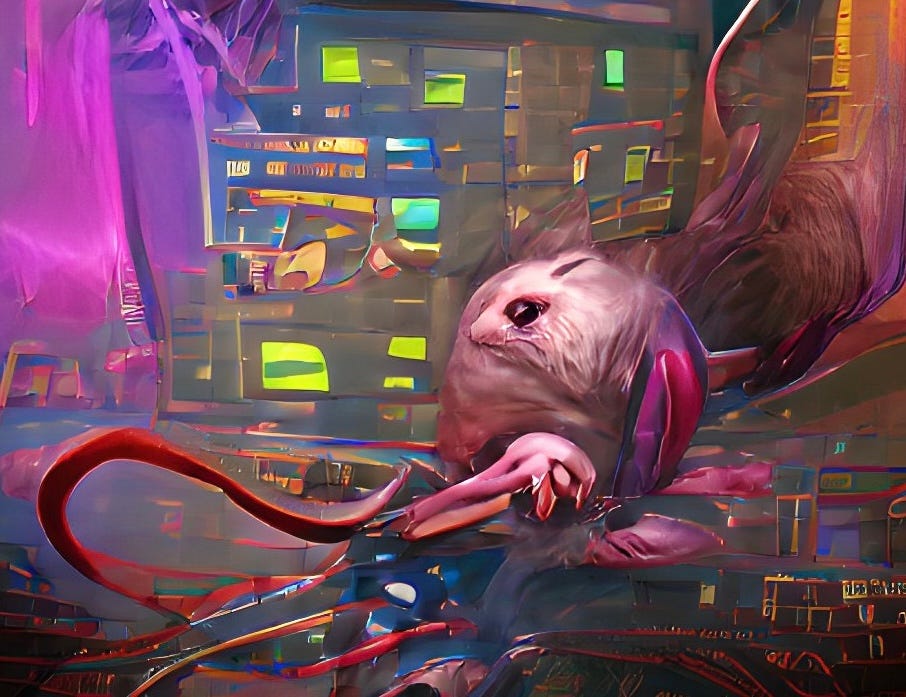“The Botapocalypse” refers to the proliferation of “bots” on social media and the internet and the tipping point we’ve reached where there are more bots online than humans. But what will we call bots in the metaverse?
Louis Rosenberg, Ph.D., the founder of a company called Unanimous.Ai, calls metaverse bots “Elves.” His company aims to create a program to “amplify the intelligence of human groups by developing a new form of AI, based on the biological principles of Swarm Intelligence,” and his somewhat frightening bio gives the impression that he knows things… things that would disturb us all.
Rosenberg writes that in the future, there will be “Elves” in the metaverse. These meta-elves will be figments of our individual shopping preferences, interests, and desires, each born from what companies glean about us as users and consumers, like customized walking ads in the form of digital life coaches. He says the metaverse will be filled with these elves and they will follow us around our own personal digital Walmart and watch movies with us inside virtual theaters, kind of like an embodied 3D Siri or Alexa, customized to look exactly how we want, just as we ourselves will look however we want in our own avatar skins.
Let’s say that again…
Meta-elves will be figments of our individual shopping preferences.
Are you concerned yet? Or excited?
This article got me thinking about the nature of bots in the metaverse. However, Elves really seems like the wrong word, especially since it’s already fully adopted by the psychedelic community to describe the entities in the DMT realm— the DMT Elves aka Machine Elves, and since life already feels like a simulation, I don’t think we should conflate the metaverse with whatever is out there beyond three hits of DMT. If you don’t know what I’m talking about in regards to self-transforming DMT elves, catch up here.
My knee jerk reaction to the elves was to rename them Meta-Angels, after the FKA twigs song of the same name. FKA twigs sings:
I wish I had help from a deeper force
Some kind of meta-angel
Then they could whisper all the answers
And maybe life would just slow down… I need a meta-angel.
But let’s not pretend these operating-system-sleeves are benevolent creatures. In Rosenberg’s world, these botbodies exist to manipulate you. They aren’t angels they’re meta-agents, like the CIA but with AI, the commercial artificial intelligent agent — the CAIA, if you will.
The meta-agents could be overt, or subtle… Instead of a pushy salesman, maybe you’ll meet a hot guy named Connor by the bookshelf inside the Amazon metaverse who bats his eyelashes and says, I just loved that new Sally Rooney book… Have you read it?
Maybe we’ll love interacting with the meta-agents just like a child loves their imaginary friend, or maybe they’ll be a nuisance that corporations push on us as soon as we enter their digital stores, leading us like lemmings to the check-out counter. As I think about them lurking in digital commerce spaces, I'm reminded of the cult classic movie, MallRats. Rat also implies large volumes of creatures. Hence, let's adopt the name MetaRats.
These MetaRats will want our cash money, our bit-cheddar, our bitcheese, which bitch-please, now I’m really having fun with language.
In the words of Rosenberg:
“Because these AI agents will look and sound like anyone else in the metaverse, our natural skepticism to advertising will not protect us. For these reasons, we need to regulate AI-driven conversational agents, especially when they have access to our facial and vocal affects, enabling our emotions to be used against us in real-time.”
And here, my friends, we have a pointed call to end the botapocalypse before it reaches the metaverse. Will we do it? Probably not. Why? Because corporations, like humans, love money and don’t like limitations.
For this reason and many others, I’m most excited about metaverse communities like Decentraland, which are trying to run on blockchain technology vs a corporation owning the metaverse. In a decentralized blockchain metaverse, users with voting rights will control their virtual world. That’s the world I want to inhabit — one where I have some control.
And what does this have to do with my Charlotte Dune books? I don’t know, but this is what I’m thinking about lately.
If you enjoyed this post, please share it with your friends. These futuristic ethical problems are coming faster than we think and it’s important to think about and discuss them.
Also, please enjoy this round-up of sci-fi book covers created with AI. My cover image for this installment of the Lagoon was also made with AI.
Thanks for reading.












